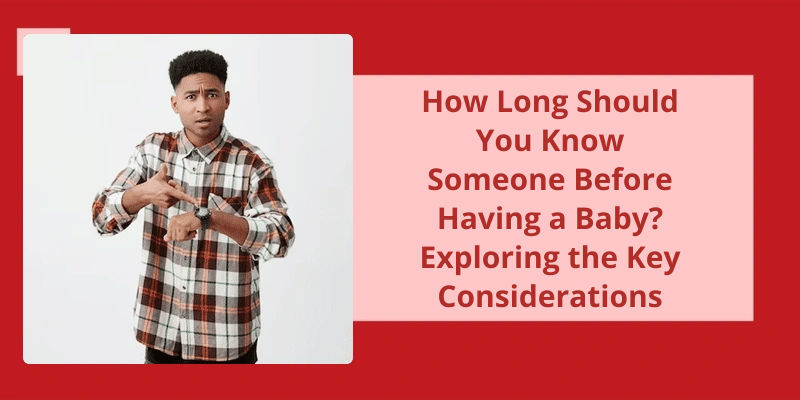The decision to have a baby is a life-changing one that demands careful thought and consideration. Bringing a new life into this world is an exciting and rewarding experience that requires commitment, patience, and sacrifice. However, timing is everything when it comes to having a baby. How long should you know someone before having a baby? This is a complex question that doesn’t have a one-size-fits-all answer. There are many factors to consider, such as emotional, financial, and physical readiness, as well as personal beliefs and values.
How Long Should You Be Together Before Trying for a Baby?
Deciding to have a baby is undoubtedly a life-changing event that requires careful consideration and planning. Many factors come into play, such as your age, health, financial stability, and commitment to parenthood. One critical factor that often gets overlooked is the timing of conception. How long should you be together before trying for a baby, and what’s the best interval between pregnancies?
Research shows that spacing pregnancies too close together or too far apart can have adverse effects on your health and the babys. To reduce the risk of pregnancy complications and other health problems, experts suggest waiting 18 to 24 months but less than five years after a live birth before attempting your next pregnancy. This period allows your body to recover from the physical strain of childbirth and replenish depleted nutrients such as folate, iron, and calcium, which are crucial for a healthy pregnancy.
Another reason for spacing pregnancies is to avoid the increased risk of preterm birth, low birth weight, and poor fetal growth associated with short birth intervals. Studies show that women who wait less than six months before getting pregnant again have a higher risk of premature birth and other adverse outcomes. On the other hand, waiting too long before trying for another baby can also increase your risk of complications such as miscarriage, stillbirth, and gestational diabetes.
It’s also essential to factor in your age when planning a pregnancy. Women who’re over 35 have a higher risk of fertility problems, miscarriage, and chromosomal abnormalities in the baby. Therefore, it’s advisable to start trying to conceive earlier, and if you’re planning to space your pregnancies, keep in mind that your biological clock also ticks away.
Ultimately, the best interval between pregnancies depends on various factors unique to each individual, such as medical history, overall health, and lifestyle. It’s advisable to consult your healthcare provider to assess your readiness for a subsequent pregnancy and plan accordingly. In addition, maintaining a healthy lifestyle, including a balanced diet, regular exercise, and reducing stress, can help optimize your chances of having a healthy pregnancy and baby.
While there’s no hard and fast rule when it comes to getting intimate with someone new, many experts agree that it’s important to take time to get to know your partner and build a strong emotional connection before jumping into bed. In fact, research suggests that waiting a few months into a relationship can actually strengthen the bond between partners, leading to greater satisfaction and longevity in the relationship. Here, we’ll take a closer look at the benefits of waiting to have sex and explore some tips for building a deeper connection with your partner.
How Soon Is Too Soon to Sleep With Someone?
The question of when it’s appropriate to have sex with someone is a difficult one to answer, as it largely depends on the individuals involved and the nature of their relationship. However, researchers have attempted to establish guidelines for when it might be best to begin a sexual relationship. According to one study, waiting at least three months into a relationship is a good idea, as this allows time for the initial “honeymoon phase” to pass and for partners to get to know each other better.
The honeymoon phase is the time at the beginning of a relationship when everything feels new and exciting, and partners are more likely to overlook flaws or difficulties that could arise later on. Waiting until this phase has passed can help avoid making rushed decisions based solely on strong emotions, and can give partners a better sense of whether they’re truly compatible. Additionally, waiting can build anticipation and add to the excitement of finally being intimate with each other.
However, it’s important to note that this timeline isn’t a hard and fast rule, and that each couple must decide for themselves what feels right. Some couples may feel comfortable having sex earlier, while others may choose to wait longer. Ultimately, the decision to become sexually active should be based on mutual respect, consent, and a desire to deepen the emotional connection between partners.
Other factors that may influence when partners choose to have sex include age, cultural norms, religious beliefs, and past experiences. For example, some may feel more comfortable waiting until marriage to have sex, while others may be more open to casual sexual encounters. It’s important for partners to discuss their expectations and boundaries openly and honestly, in order to avoid misunderstandings or hurt feelings later on.
Whatever timeline or approach partners choose, it’s important to prioritize communication, consent, and safety. Sex should never be used as a tool to manipulate or control someone else, and should always be entered into willingly and enthusiastically by both partners. Taking time to build trust and intimacy before becoming sexually active can help create a stronger foundation for a successful relationship in the long run.
The question of when it’s too soon to have sex with someone is a complex and personal one. What’s most important is that partners approach sex with openness, respect, and a commitment to mutual pleasure and safety. By prioritizing communication, honesty, and respect, couples can build stronger, healthier relationships that are based on true intimacy and trust.
Conclusion
In conclusion, the decision to have a baby is a deeply personal one, influenced by a myriad of factors such as financial stability, emotional readiness, and relationship dynamics. While knowing someone for a significant period of time may provide a sense of security and comfort, there’s no magic number of months or years that guarantees a successful journey into parenthood. Ultimately, what matters most is the level of commitment and mutual understanding between partners, as well as a solid foundation of love and trust. It’s important to carefully consider all aspects of the decision and seek guidance from trusted sources before embarking on this life-changing experience.






